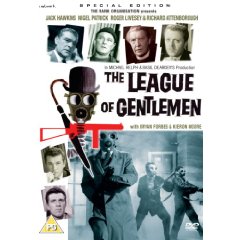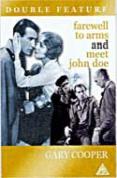 The League Of Gentlemen Special Edition | DVD | (17/04/2019)
from £N/A
| Saving you £N/A (N/A%)
| RRP
The League Of Gentlemen Special Edition | DVD | (17/04/2019)
from £N/A
| Saving you £N/A (N/A%)
| RRP A former army officer bitter at being made to retire early uses his special access to military personnel files to plot a 1 million bank robbery and sets about gathering an unlikely assortment of accomplices
![The League of Gentlemen [DVD]](/pictures/1153142.jpg) The League of Gentlemen | DVD | (13/01/2020)
from £16.98
| Saving you £N/A (N/A%)
| RRP
The League of Gentlemen | DVD | (13/01/2020)
from £16.98
| Saving you £N/A (N/A%)
| RRP A disgruntled veteran recruits a group of disgraced colleagues to perform a bank robbery with military precision
![Gypsy Woman [2003]](/pictures/1017339.jpg) Gypsy Woman | DVD | (07/02/2005)
from £11.91
| Saving you £-5.92 (N/A%)
| RRP
Gypsy Woman | DVD | (07/02/2005)
from £11.91
| Saving you £-5.92 (N/A%)
| RRP Whilst attending the inquest surrounding the death of one his workers property developer Leon Hawthorne meets the deceased man's widow Natalie. Enchanted he sets about tracking her down...
![The League Of Gentlemen [1960]](/pictures/1013192.jpg) The League Of Gentlemen | DVD | (15/01/2001)
from £14.98
| Saving you £0.01 (0.07%)
| RRP
The League Of Gentlemen | DVD | (15/01/2001)
from £14.98
| Saving you £0.01 (0.07%)
| RRP The League of Gentlemen is a sardonic crime drama in which Jack Hawkins plays an embittered retired army officer who recruits seven fellow ex-soldiers to carry out a bank raid with military precision. The film presents an England between post-war austerity and the more liberated 1960s where traditional moral certainties were rapidly being discarded; a London where ex-officers left on the scrapheap at war's end could justify turning their military experience to armed robbery. Unfortunately the tale is neither particularly amusing or thrilling, with an overlong central detour via an army camp prefacing the exciting heist and a largely anti-climactic ending. Nevertheless Hawkins effectively subverts his heroic officer type from The Cruel Sea (1953) and The Bridge on the River Kwai (1957), and there's excellent support from a great cast including Nigel Patrick, Richard Attenborough and Roger Livesey. Bryan Forbes not only wrote the cynical screenplay but costarred with wife Nanette Newman in her first significant screen role. More influential than truly classic, The League of Gentlemen has lent its name to a modern BBC comedy, an "Extraordinary" comic strip-turned-movie, and proved the template for heist films ever since, including both versions of The Italian Job (1969 and 2003). On the DVD:The League of Gentlemen is presented in an anamorphically enhanced 16:9 transfer from an excellent condition print and mostly looks and sounds fine. There's minimal print damage, though sadly Philip Green's ironically patriotic main title music suffers from significant distortion. The only extra is the original trailer, which is now something of a period piece itself. --Gary S Dalkin
![The League Of Gentlemen [1960]](/pictures/1012093.jpg) The League Of Gentlemen | DVD | (26/01/2004)
from £N/A
| Saving you £N/A (N/A%)
| RRP
The League Of Gentlemen | DVD | (26/01/2004)
from £N/A
| Saving you £N/A (N/A%)
| RRP The League of Gentlemen is a sardonic crime drama in which Jack Hawkins plays an embittered retired army officer who recruits seven fellow ex-soldiers to carry out a bank raid with military precision. The film presents an England between post-war austerity and the more liberated 1960s where traditional moral certainties were rapidly being discarded; a London where ex-officers left on the scrapheap at war's end could justify turning their military experience to armed robbery. Unfortunately the tale is neither particularly amusing or thrilling, with an overlong central detour via an army camp prefacing the exciting heist and a largely anti-climactic ending. Nevertheless Hawkins effectively subverts his heroic officer type from The Cruel Sea (1953) and The Bridge on the River Kwai (1957), and there's excellent support from a great cast including Nigel Patrick, Richard Attenborough and Roger Livesey. Bryan Forbes not only wrote the cynical screenplay but costarred with wife Nanette Newman in her first significant screen role. More influential than truly classic, The League of Gentlemen has lent its name to a modern BBC comedy, an "Extraordinary" comic strip-turned-movie, and proved the template for heist films ever since, including both versions of The Italian Job (1969 and 2003). On the DVD:The League of Gentlemen is presented in an anamorphically enhanced 16:9 transfer from an excellent condition print and mostly looks and sounds fine. There's minimal print damage, though sadly Philip Green's ironically patriotic main title music suffers from significant distortion. The only extra is the original trailer, which is now something of a period piece itself. --Gary S Dalkin
![A Farewell To Arms [1932]](/pictures/1012361.jpg) A Farewell To Arms | DVD | (11/08/2003)
from £7.79
| Saving you £-2.80 (N/A%)
| RRP
A Farewell To Arms | DVD | (11/08/2003)
from £7.79
| Saving you £-2.80 (N/A%)
| RRP Ernest Hemingway's tragic wartime romance comes to vivid life in this classic 1932 film starring Oscar winners Gary Cooper and Helen Hayes. The cataclysm of WW1 sets the stage for an impassioned story of star-crossed love between a daring American ambulance driver (Cooper) and an English nurse (Hayes) in an army hospital. The tumult of war conspires to push the pair together and then wrench them apart in what becomes an ultimate test of love. Boasting beautiful cinematogrpahy and poe
![A Christmas Carol / Old Scrooge [DVD]](/pictures/1097407.jpg) A Christmas Carol / Old Scrooge | DVD | (02/11/2009)
from £55.79
| Saving you £-48.54 (N/A%)
| RRP
A Christmas Carol / Old Scrooge | DVD | (02/11/2009)
from £55.79
| Saving you £-48.54 (N/A%)
| RRP Charles Dickens' A Christmas Carol is a Victorian morality tale of an old and bitter miser Ebenezer Scrooge who undergoes a profound experience of redemption over the course of one Christmas Eve. We are proud to bring you two versions of this holiday classic.
![A Farewell To Arms [1932]](/pictures/1012082.jpg) A Farewell To Arms | DVD | (26/01/2004)
from £4.90
| Saving you £1.09 (22.24%)
| RRP
A Farewell To Arms | DVD | (26/01/2004)
from £4.90
| Saving you £1.09 (22.24%)
| RRP This dense adaption of Ernest Hemmingway's novel features Gary Cooper as American soldier Lt. Henry and his illfated love affair with British Nurse Catherine portrayed by Hellen Hayes during World War I. Filmed in beautiful Italy the two lovers will stop at nothing to be together but Lt. Henry's internal struggles ultimately threaten the relationship. Hemmingway's theme of questioning the nature of war and fighting is fully recognised under Frank Borzage's direction.
![A Farewell To Arms [1932]](/pictures/1013034.jpg) A Farewell To Arms | DVD | (01/07/2001)
from £N/A
| Saving you £N/A (N/A%)
| RRP
A Farewell To Arms | DVD | (01/07/2001)
from £N/A
| Saving you £N/A (N/A%)
| RRP The 1932 version of A Farewell to Arms owes as much to the shimmering house style of Paramount Pictures as it does the novel by Ernest Hemingway. If Hemingway purists can get past the romanticising of the book, however, this film offers its own glossy appeal. On the Italian front in World War I an American ambulance driver (Gary Cooper) falls in love with a nurse (Helen Hayes). Cooper was a Hemingway friend in real life, and later played the hero of Hemingway's For Whom the Bell Tolls; his boyish simplicity is just right for director Frank Borzage's heartfelt approach. The Oscar-winning cinematography of ace cameraman Charles Lang is the kind of lush black and white that can capture the glow from a cigarette as it plays across Cooper's darkened face--a breathtaking touch. The jaded battle scenes show the influence of the hit film version of All Quiet on the Western Front, especially in a gripping montage depicting Cooper's progress alone through the war zone. Hemingway would have none of it, of course; he once disdainfully wrote that "in the first picture version Lt. Henry deserted because he didn't get any mail and then the whole Italian Army went along, it seems, to keep him company". This is first and foremost a love story, however, and as such it succeeds beautifully, right through to the remarkably intense ending. --Robert Horton, Amazon.com
![A Farewell To Arms [1932]](/pictures/1012889.jpg) A Farewell To Arms | DVD | (18/02/2002)
from £N/A
| Saving you £N/A (N/A%)
| RRP
A Farewell To Arms | DVD | (18/02/2002)
from £N/A
| Saving you £N/A (N/A%)
| RRP This dense adaption of Ernest Hemmingway's novel features Gary Cooper as American soldier Lt. Henry and his ill-fated love affair with British Nurse Catherine portrayed by Hellen Hayes during World War I. Filmed in beautiful Italy the two lovers will stop at nothing to be together but Lt. Henry's internal struggles ultimately threaten the relationship. Hemmingway's theme of questioning the nature of war and fighting is fully recognised under Frank Borzage's direction.
![Blood Dolls [1999]](/pictures/1021881.jpg) Blood Dolls | DVD | (12/04/2004)
from £N/A
| Saving you £N/A (N/A%)
| RRP
Blood Dolls | DVD | (12/04/2004)
from £N/A
| Saving you £N/A (N/A%)
| RRP Virgil is an eccentric freak a brilliant billionaire with a head the size of an avocado. He finds amusement in his personal 'house band': four beautiful rock and roll girls-in-a-cage who play on command... He's also a 'biological inventor'. His latest creations Blood Dolls are obedient little creatures with deadly features. About to be betrayed by those he most closely trusts Virgil and his 'family' of freaks are about to exact the ultimate revenge.
![A Farewell To Arms [1932]](/pictures/1047846.jpg) A Farewell To Arms | DVD | (01/09/2003)
from £5.80
| Saving you £-1.81 (N/A%)
| RRP
A Farewell To Arms | DVD | (01/09/2003)
from £5.80
| Saving you £-1.81 (N/A%)
| RRP  Farewell To Arms, A / Meet John Doe | DVD | (08/05/2006)
from £6.15
| Saving you £-1.16 (-23.20%)
| RRP
Farewell To Arms, A / Meet John Doe | DVD | (08/05/2006)
from £6.15
| Saving you £-1.16 (-23.20%)
| RRP Farewell To Arms (Dir. Frank Borzage 1932): Ernest Hemingway's tragic wartime romance comes to vivid life in this classic 1932 film starring Oscar winners Gary Cooper and Helen Hayes. The cataclysm of WW1 sets the stage for an impassioned story of star-crossed love between a daring American ambulance driver (Cooper) and an English nurse (Hayes) in an army hospital. The tumult of war conspires to push the pair together and then wrench them apart in what becomes an ultimate tes

Please wait. Loading...
This site uses cookies.
More details in our privacy policy